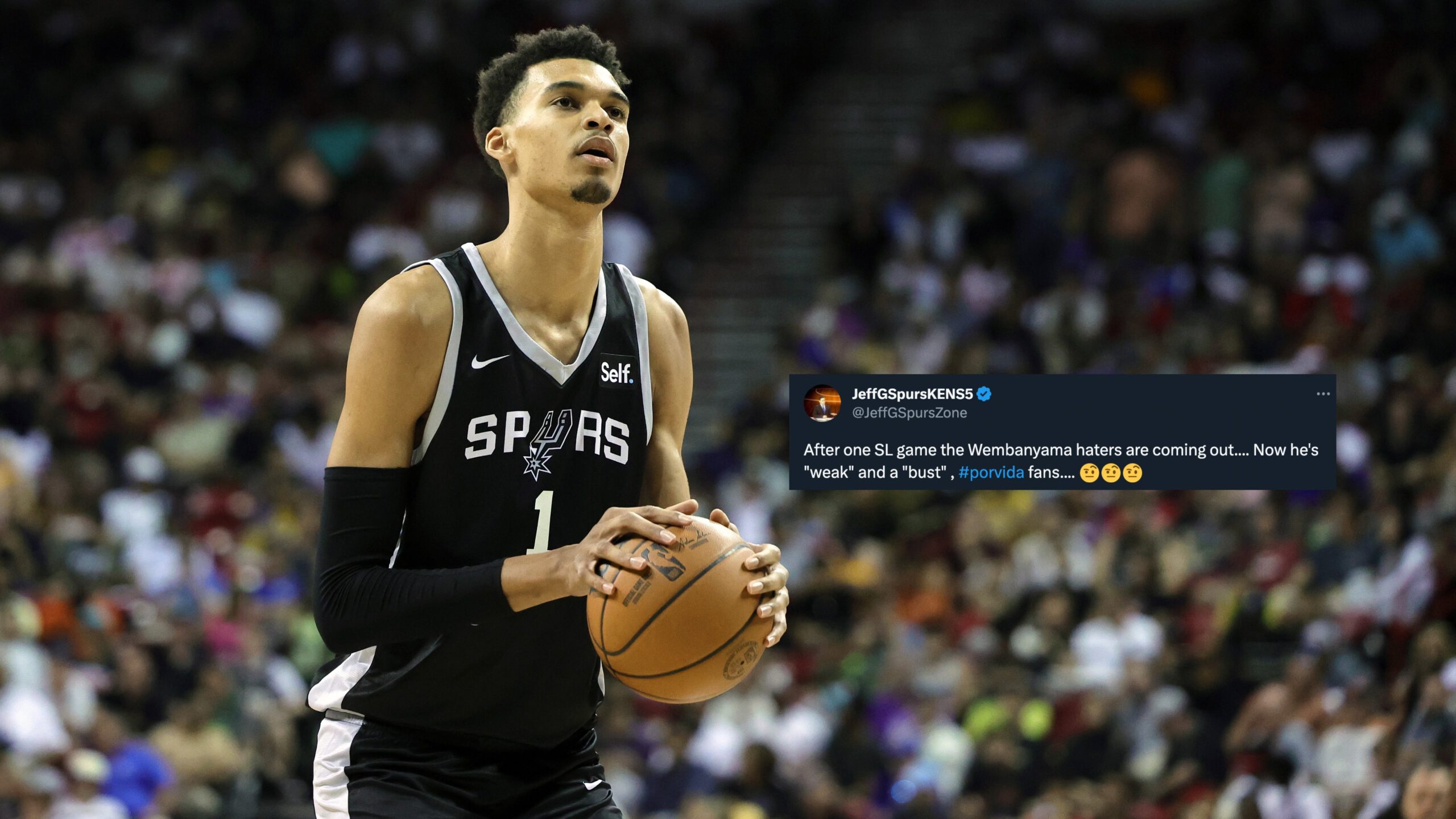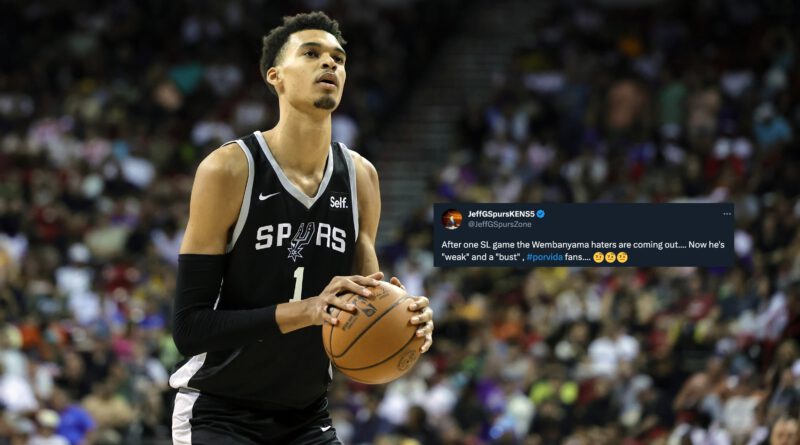Victor Wembanyama’s Summer League debut was NBA Twitter’s hype cycle at its silliest

NBA Twitter loves a Narrative. The online space, and the league’s fandom in general, feeds on drama, intrigue, and overreacting. It’s silly, in a lovely, online way.
That was never more on display than during No. 1 overall pick Victor Wembanyama’s Summer League debut on Friday and, subsequently, his second game on Sunday. The 7’5″ French center/forward, drafted last month by the San Antonio Spurs, has received every superlative possible: general talent, an “alien,” “maybe the greatest prospect in the history of team sports.” The expert consensus seems to be he’s the greatest prospect to enter the league since LeBron James, which is high praise.
Then he had to, you know, play NBA basketball. (If you can call Summer League games NBA basketball at all.) The Summer League’s ongoing games in Vegas are a mix of pick-up, preseason, and practice — there are touted guys like Wembanyama, long-shots fighting for a contract, and people hanging on to the last semblance of their pro-ball dreams. It’s sloppy, disorganized, and exactly the sort of thing NBA Twitter decided would predict Wembanyama’s future.
In his first game on Friday, Wembanyama scored just nine points on two-of-13 shooting. It was…not ideal. For about 48 hours, a certain subset of Twitter called him a draft bust. Then, come Sunday, he had an amazing second Summer League game, dropping 27 points, scoring efficiently, and defending like a pro on the court.
Search “Wembanyama bust” on Twitter and you’ll get whiplash from the tweets last weekend.
The truth is, we have zero idea what Wemby will become as a player. He played two meaningless basketball games, under intense media scrutiny, immediately after leaving his home country and becoming an American celebrity overnight. Bill Simmons, founder of The Ringer and one of the more prominent media voices in basketball, addressed the wild overreaction to open the most recent episode of his podcast.
Simmons said:
“He was written off Friday night. He was a bust. He was Greg Oden, LaRue Martin, Shawn Bradley, pick a bust. It was where we were headed, everyone was freaking out. It was dark. I could give you some of the stories of being in the building for that one. And then Sunday, I can’t believe it! Forty-eight hours later, a generational possible superstar actually looked pretty good. So I’m going to give everyone some settle-down juice.”
This is all true, 100 percent. What Simmons and parts of NBA fandom seem to miss sometimes is that not settling down is entirely the point with NBA Twitter and what large swaths of basketball fandom has become. Yes, it’s about the games played on a court, but it’s also about everything else. Why do you think NBA fans love the offseason so much? Why do we love when people switch teams, and petty spats started on podcasts, and heroes falling and villains rising? It’s reality television in 2023.
I should know, as both Mashable’s resident Bravo expert and sports writer. NBA fandom is more online than any other American sport. It’s the reason NBA Twitter is such a thing, while even the more popular league, the NFL, doesn’t quite get there. Like Bravo, a lot of people enjoy the NBA more for the drama than the actual product. It’s about the storylines, the narrative. It’s who we’re granting the good edit. Hell, NBA players regularly date reality stars like it’s some sort of crossover episode.
In a time where drama can easily turn reality stars rich — think brand deals, Instagram ads, etc. — it makes sense we’d also turn our impossibly wealthy sports stars into reality figures we argue about with very little basis in…actual reality.
So of course NBA fans were dying to hype Wemby up and then pull him down — it’s what an online fandom does best. If you think it’s any different than a Bravo fan parsing through Tom Sandoval and Ariana Madix’s entire relationship timeline to fully dig out every Easter egg of the Scandoval, then pal I don’t know what to tell you… You’re wrong.
Sure, there are NBA diehards who watch every game on League Pass and can easily tell you what a horns set looks like in the half-court. Most of us are casuals, though. We want to make lizard-brained arguments and take the tiniest bit of evidence and stretch it into entire beliefs. We want to speculate and dig our heels in.
To be clear, the overzealous sports fan has long been unreasonable on drive-time radio. You’d be well within your rights to say the parasocial fandoms we see across the world now —K-pop stans, Swifties, Bravo-verse devotees — took their cues from sports fans who have long referred to their team as “we.” But now everything moves faster. NBA fandom largely exists online, and the sports world is just catching up to this idea, whereas the aforementioned fans were borne out of online communities. The Wembanyama whiplash was dumb and silly, and it’s exactly what we can expect moving forward.
There’s this thing with NBA writers and podcasters, like Simmons, or ESPN’s Brian Windhorst, or Zach Lowe, who explicitly tell aggregators, hey, this is just speculation, please don’t write about this. They’re diehard hoops people, misunderstanding that a large part of the league’s appeal — what helps bring in the massive checks for players, coaches, and media stars alike — is the NBA Twitter ecosystem, often-wrong aggregation accounts included. The league functions on actual games, sure, but also gossip, rivalries, quote-tweets, aggregation, and, of course, overreaction. It’s been that way for years.
Was it too early to deem Wembanyama a bust after Game 1 of the Summer League? Of course. It’s also silly to hype him as the real deal after Game 2. But that’s the fun. Every character needs a compelling storyline. As NBA great and burner account-user Kevin Durant once said, “There’s No relax champ. No relax when I’m on Twitter. I’m on 10 until the second I close the app. You relax!!”
